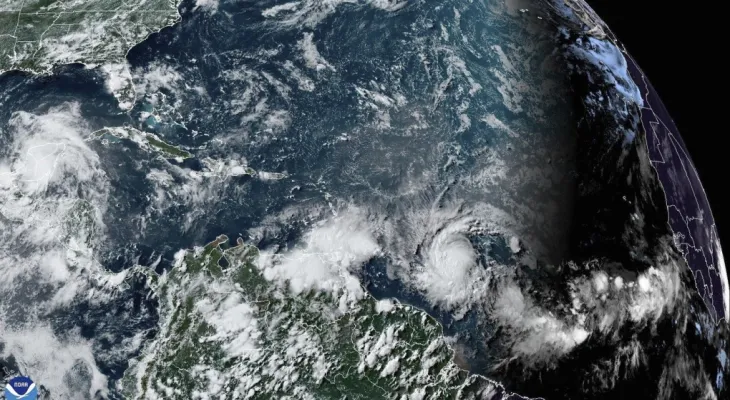Search here
Newspaper
Search here

Arab Canada News
News

Published: June 30, 2024
It is expected that Hurricane Beryl will transform into a strong Category 4 storm as it approaches the southeast Caribbean Sea, which began to stall on Sunday amid urgent calls from government officials for people to take shelter.
Hurricane warnings were in effect for Barbados, Saint Lucia, Grenada, Saint Vincent, and the Grenadines.
The National Hurricane Center in Miami warned that "this is a very serious situation developing for the Windward Islands," and stated that Beryl "is expected to bring life-threatening winds and storm ... as a very dangerous hurricane."
Beryl intensified into a Category 3 hurricane early Sunday, becoming the first major hurricane recorded east of the Lesser Antilles for the month of June, according to Philip Klotzbach, a hurricane researcher at Colorado State University.
Beryl is now the third Category 3 hurricane ever recorded in the Atlantic in June, after Audrey in 1957 and Alma in 1966, according to hurricane expert Michael Borys.
Beryl is located about 465 miles (750 kilometers) east-southeast of Barbados. It was a Category 2 storm with maximum sustained winds of 100 miles per hour (155 km/h) and was moving west at 21 miles per hour (33 km/h).
Two hurricane hunters were on their way to the storm to gather more details about its intensity, according to the National Hurricane Center.
Beryl is expected to pass south of Barbados early Monday and then head into the Caribbean Sea as a major hurricane on its way toward Jamaica. It is expected to weaken by midweek but will still be classified as a hurricane as it heads toward Mexico.
Forecasters warned of life-threatening storm surges of up to 9 feet (3 meters) in areas where Beryl makes landfall, with up to six inches (15 cm) of rain in Barbados and nearby islands.
Long lines formed at gas stations and grocery stores in Barbados and other islands as people rushed to prepare for a record-breaking storm that swiftly intensified from a tropical storm with 35 mph winds on Friday to a Category 1 hurricane on Saturday.
Warm waters fed Beryl, with ocean heat content in the depths of the Atlantic being the highest ever recorded for this time of year, according to Brian McNoldy, a tropical meteorologist at the University of Miami.
Beryl represents the farthest east that a hurricane forms in the Atlantic tropics in June, breaking the record set in 1933, according to Philip Klotzbach, a hurricane researcher at Colorado State University. He stated that if Beryl's wind speed reaches 125 mph, it would be the second earliest storm of its kind in the Atlantic ever, surpassing Audrey in 1957.
Additionally, if Beryl reaches Category 3, it would be only the third storm to do so in the Caribbean before August; both Dennis and Emily did this in July 2005, according to Klotzbach.
Barbados Prime Minister Mia Mottley said in a public address Saturday evening, "We must remain vigilant." "We do not want to put anyone's life in danger."
Thousands of people were in Barbados for the Twenty20 World Cup final on Saturday, the biggest event in cricket, and Mottley noted that not all fans would be able to leave on Sunday despite many rushing to change their flights.
She said, "Some of them have never been through a storm before." "We have plans to take care of them."
Mottley added that all businesses must close their doors on Sunday evening, warning that the airport would close at night.
Kemar Savery, head of a Barbados group aimed at ending homelessness, said in a social media video Saturday night that those without homes tend to believe they can survive storms because they have done so in the past.
He said, "I do not want this to be the mindset they adopt," warning that Beryl is a dangerous storm and urging residents of Barbados to direct homeless people to shelters.
Wilfried Abrahams, the Minister of Home Affairs and Information echoed his statements.
He said, “I need Barbadians to be guardians of their brothers at this stage.” "Some people are vulnerable."
Meanwhile, Saint Lucia Prime Minister Philip J. Pierre announced a national shutdown for Sunday evening and said that schools and businesses would remain closed on Monday.
He added, "Preserving life and protecting it is a priority."
Caribbean leaders were preparing to face not only Beryl but also a cluster of thunderstorms that follow the hurricane, which has a 70% chance of turning into a tropical depression.
Mottley said, "Do not let your guard down."
Beryl is the second storm in what is expected to be an above-average hurricane season, which runs from June 1 to November 30 in the Atlantic. Earlier this month, Tropical Storm Alberto made landfall in northeastern Mexico with heavy rains that led to the deaths of four people.
The National Oceanic and Atmospheric Administration expects the 2024 hurricane season to be well above average, with between 17 and 25 named storms. Forecasters predict up to 13 hurricanes and four major hurricanes.
The average Atlantic hurricane season produces 14 named storms, seven of which are hurricanes and three of which are major hurricanes.
Comments